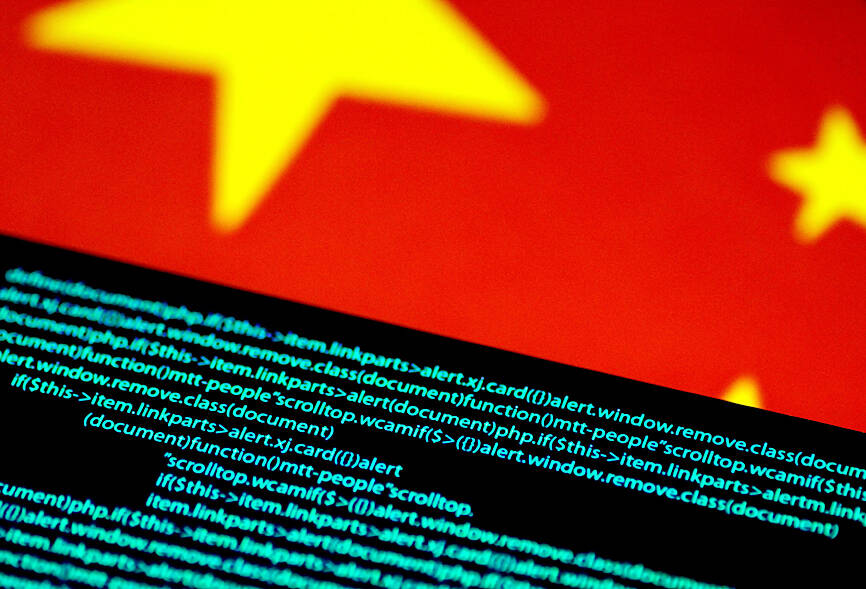Western intelligence agencies on Tuesday warned of an increasing threat from Beijing’s security services to use malicious mobile phone applications to surveil Taiwanese independence activists, Tibetan rights advocates and others opposed by the Chinese government.
An advisory issued late on Tuesday warned of “the growing threat” posed by malicious surveillance software deployed by a Chengdu, China-based contractor reported to have ties to the Chinese Ministry of Public Security.
The advisory was signed by cybersecurity agencies in the UK, the US, Canada, New Zealand, Australia and Germany.

Photo: Reuters
Those most at risk include people connected to Taiwanese independence, Tibetan rights, Uighurs and other minorities in Xinjiang, democracy advocates — including in Hong Kong — and the Falun Gong spiritual movement, the British National Cyber Security Centre (NCSC) said in the advisory.
The warning comes amid increasing tensions surrounding Taiwan, including Chinese military drills around the nation on Tuesday and Wednesday last week, and a March 28 visit to the Philippines by US Secretary of Defense Pete Hegseth in which he reaffirmed Washington’s commitment to deterring Chinese aggression in the region.
The Chengdu-based contractor, Sichuan Dianke Network Security Technology Co Ltd (四川電科網路安全技術有限公司), was linked to the deployment of a pair of distinct malware packages. They were tracked as “Badbazaar” and “Moonshine” and used to ferret sensitive information from mobile devices, while also giving operators remote access to devices’ cameras, microphones and location data, the advisory said.
The warning is for non-governmental organizations, journalists, businesses and other individuals who advocate for or represent the groups, the NCSC said in the advisory.
“The indiscriminate way this spyware is spread online also means there is a risk that infections could spread beyond intended victims,” it said.
Chinese embassy in Washington spokesman Liu Pengyu (劉鵬宇) said that China “firmly opposes the smear attacks against China without any factual basis,” and that the tracing of cyberattacks is complex.
“We hope that relevant parties will adopt a professional and responsible attitude when characterizing cyberincidents, basing their conclusions on sufficient evidence rather than unfounded speculation and accusations,” he said.
The warnings build on previous cybersecurity industry reporting that malware and infrastructure have been used by the contractor going back several years. The advisory cited a Jan. 29 report published by Intelligence Online, a news organization focused on international intelligence operations, linking the malware to the contractor.
The contractor has provided services to the Chinese ministry, the report said.
The FBI, US National Security Agency and intelligence agencies in Australia, Canada, Germany and New Zealand participated in the advisories, the NCSC said.
The FBI declined to comment, and the NSA did not respond to requests for comment.

ACTION PLAN: Taiwan would expand procurement from the US and encourage more companies to invest in the US to deepen bilateral cooperation, Lai said The government would not impose reciprocal tariffs in retaliation against US levies, President William Lai (賴清德) said yesterday, as he announced five strategies to address the issue, including pledging to increase Taiwanese companies’ investments in the US. Lai has in the past few days met with administrative and national security officials, as well as representatives from various industries, to explore countermeasures after US President Donald Trump on Wednesday last week announced a 32 percent duty on Taiwanese imports. In a video released yesterday evening, Lai said that Taiwan would not retaliate against the US with higher tariffs and Taiwanese companies’ commitments to

Intelligence agents have recorded 510,000 instances of “controversial information” being spread online by the Chinese Communist Party (CCP) so far this year, the National Security Bureau (NSB) said in a report yesterday, as it warned of artificial intelligence (AI) being employed to generate destabilizing misinformation. The bureau submitted a written report to the Legislative Yuan in preparation for National Security Bureau Director-General Tsai Ming-yen’s (蔡明彥) appearance before the Foreign Affairs and National Defense Committee today. The CCP has been using cognitive warfare to divide Taiwanese society by commenting on controversial issues such as Taiwan Semiconductor Manufacturing Co’s (TSMC, 台積電) investments in the

HELPING HAND: The steering committee of the National Stabilization Fund is expected to hold a meeting to discuss how and when to utilize the fund to help buffer the sell-off The TAIEX plunged 2,065.87 points, or 9.7 percent, to close at 19,232.35 yesterday, the highest single-day percentage loss on record, as investors braced for US President Donald Trump’s tariffs after an extended holiday weekend. Amid the pessimistic atmosphere, 945 listed companies led by large-cap stocks — including Taiwan Semiconductor Manufacturing Co (TSMC, 台積電), Hon Hai Precision Industry Co (鴻海精密) and Largan Precision Co (大立光) — fell by the daily maximum of 10 percent at the close, Taiwan Stock Exchange data showed. The number of listed companies ending limit-down set a new record, the exchange said. The TAIEX plunged by daily maxiumu in just

‘COMPREHENSIVE PLAN’: Lin Chia-lung said that the government was ready to talk about a variety of issues, including investment in and purchases from the US The National Stabilization Fund (NSF) yesterday announced that it would step in to staunch stock market losses for the ninth time in the nation’s history. An NSF board meeting, originally scheduled for Monday next week, was moved to yesterday after stocks plummeted in the wake of US President Donald Trump’s announcement of 32 percent tariffs on Taiwan on Wednesday last week. Board members voted to support the stock market with the NT$500 billion (US$15.15 billion) fund, with injections of funds to begin as soon as today. The NSF in 2000 injected NT$120 billion to stabilize stocks, the most ever. The lowest amount it